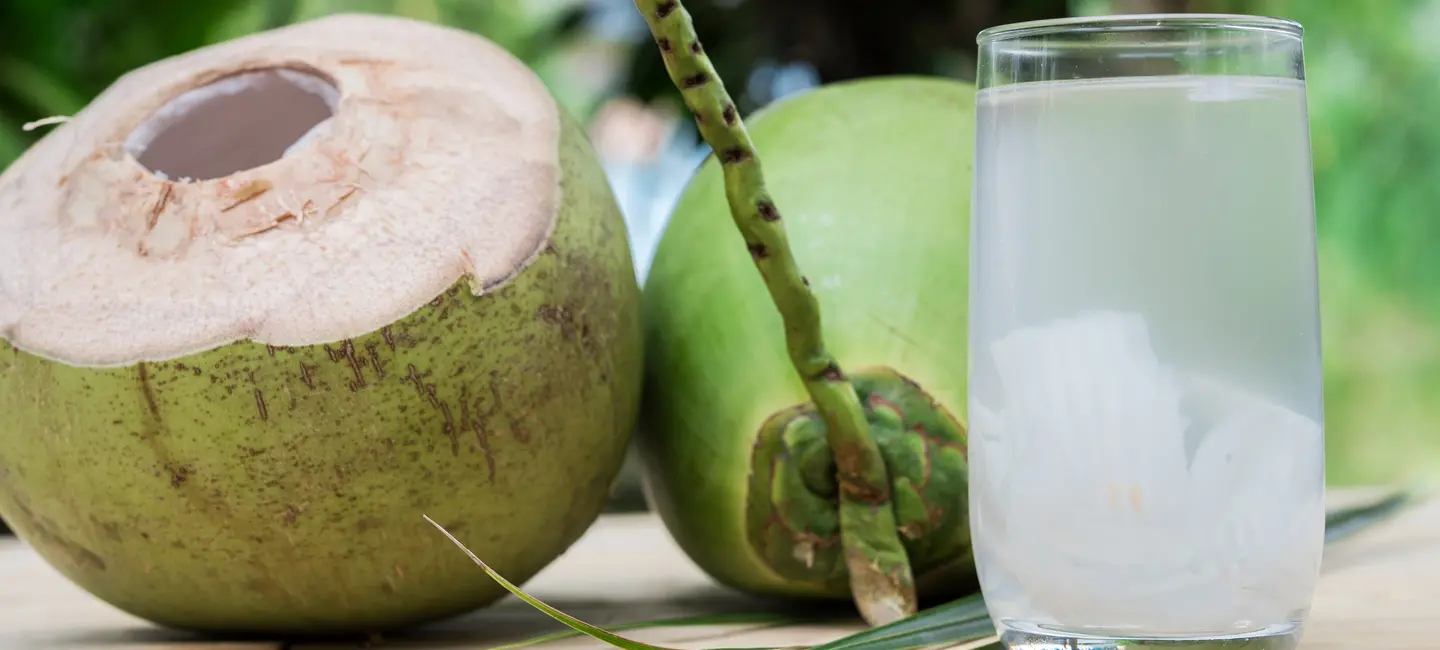
Coconut water is the clear liquid found inside immature coconuts (Cocos nucifera). As the coconut matures, the water is replaced by coconut meat.
Coconut water is rich in carbohydrates and electrolytes such as potassium, sodium, and magnesium. Because of these electrolytes, there’s a lot of interest in using coconut water to treat and prevent dehydration. Coconut water is sometimes called green coconut water because the immature coconuts are green.
People commonly use coconut water as a beverage and as a solution for treating dehydration related to diarrhea or exercise. It’s also used for high blood pressure and athletic performance, but there is no good scientific evidence to support these uses.
Don’t confuse coconut water with coconut or coconut oil. These are not the same. Also, coconut water is different than coconut milk. Coconut milk is made from a mixture of the grated meat of a mature coconut.
Is It Effective?
There is interest in using coconut milk for a number of purposes, but there isn’t enough reliable information to say whether it might be helpful.
Is it Safe?
When taken by mouth: Coconut water is commonly consumed as a drink and is likely safe. It’s usually well-tolerated.
Special Precautions & Warnings:
Pregnancy and breast-feeding: Coconut water is commonly consumed as a drink. There isn't enough reliable information to know if coconut water is safe to use as medicine when pregnant or breast-feeding. Stay on the safe side and avoid use.
Children: Coconut water is commonly consumed as a drink and seems to be safe for children. As medicine, it’s possibly safe when used appropriately.
Cystic fibrosis: Cystic fibrosis can lower salt levels in the body. Some people with cystic fibrosis need to take fluids or pills to increase salt (sodium) levels. Coconut water doesn’t contain enough salt to increase salt levels in people with cystic fibrosis. Also, it might contain too much potassium. Don't drink coconut water as way to increase salt levels if you have cystic fibrosis.
High levels of potassium in the blood: Coconut water contains high levels of potassium. Don't drink coconut water if you have high levels of potassium in the blood.
Kidney problems: Coconut water contains high levels of potassium. Normally, potassium is excreted in the urine if blood levels get too high. But this doesn’t happen if the kidneys aren’t working normally. If you have kidney problems, talk to your healthcare provider before taking coconut water.
Surgery: Coconut water might interfere with blood pressure and blood sugar control during and after surgery. Stop using coconut water at least two weeks before a scheduled surgery.
Medications for diabetes (Antidiabetes drugs)
Interaction Rating=Minor Be watchful with this combination.
Coconut water might lower blood sugar levels. Taking coconut water along with diabetes medications might cause blood sugar to drop too low. Monitor your blood sugar closely.
Medications for high blood pressure (Antihypertensive drugs)
Interaction Rating=Moderate Be cautious with this combination.
Coconut water might lower blood pressure. Taking coconut water along with medications that lower blood pressure might cause blood pressure to go too low. Monitor your blood pressure closely.
Herbs and supplements that might lower blood pressure: Coconut water might lower blood pressure. Taking it with other supplements that have the same effect might cause blood pressure to drop too much. Examples of supplements with this effect include andrographis, casein peptides, L-arginine, niacin, and stinging nettle.
Herbs and supplements that might lower blood sugar: Coconut water might lower blood sugar. Taking it with other supplements with similar effects might lower blood sugar too much. Examples of supplements with this effect include aloe, bitter melon, cassia cinnamon, chromium, and prickly pear cactus.
There are no known interactions with foods.
Coconut water is commonly consumed as a drink. It’s rich in carbohydrates and electrolytes such as potassium, sodium, and magnesium.
As medicine, it’s been used by adults in varying doses. Speak with a healthcare provider to find out what type of product and dose might be best for a specific condition.
Agua de Coco, Asian Coconut Water, Coconut Drink, Coconut Fruit Water, Coconut H2O, Coconut Juice, Coconut Palm Water, Coconut Rehydration Solution, Cocos nucifera, Eau de Coco, Eau de Coco Verte, Eau de Jeune Coco, Eau de Jeunes Noix de Coco, Eau de Noix de Coco, Eau de Noix de Coco d'Asie, Eau du Fruit du Cocotier, Fresh Young Coconut Water, Green Coconut Water, Kabuaro Water, Young Coconut Water.
Information on this website is for informational use only and is not intended to replace professional medical advice, diagnosis, or treatment. While evidence-based, it is not guaranteed to be error-free and is not intended to meet any particular user’s needs or requirements or to cover all possible uses, safety concerns, interactions, outcomes, or adverse effects. Always check with your doctor or other medical professional before making healthcare decisions (including taking any medication) and do not delay or disregard seeking medical advice or treatment based on any information displayed on this website.
© TRC Healthcare 2024. All rights reserved. Use and/or distribution is permitted only pursuant to a valid license or other permission from TRC Healthcare.
